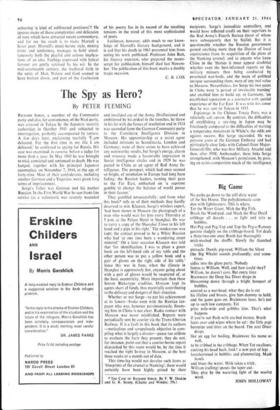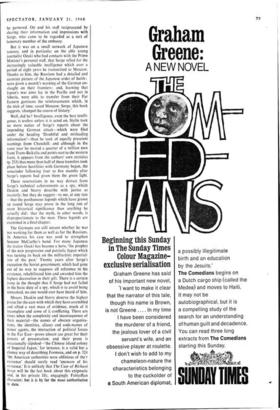The Spy as Hero?
By PETER FLEMING
RICHARD SORGE, a member of the Communist party and also, for convenience, of the Nazi party, was arrested in Tokyo by the Japanese security authorities in October 1941 and subjected to interrogation, probably accompanied by torture. A few days later, exclaiming tearfully 'Lam defeated. For the first time in my life I am defeated,' he confessed to spying for Russia. His case was examined. in camera. before a judge for more than a year. In May 1943 he was brought to trial, convicted and sentenced to death. He was hanged, together with his principal Japanese accomplice, on November 7, 1944, at the age of forty-nine. Most of their confederates, including another German and a Yugoslav, were given long terms of imprisonment.
Sorge's father was German and his mother Russian. In the First World War he saw front-line service (as a volunteer), was severely wounded and invalided out of the Army. Disillusioned and embittered by his ordeal in the trenches, he threw in his lot with the forces of revolution and in 1924 was seconded from the German Communist party to the Comintern Intelligence Division in Moscow. His apprenticeship as a secret agent included missions to Scandinavia. London and Germany; none of these seems to have achieved any noteworthy results, but Sorge's energy, charm and resource made a favourable impression in Soviet intelligence circles and in 1929 he was posted to China as an agent of Red Army In- telligence. The prospect, which had once seemed so bright, of revolution in Europe had long been fading; the Russian leaders, turning their gaze to the Far East, embarked on 'a supreme gamble to change the balance of world power in their favour.'
They gambled unsuccessfully; and from what this book* tells us of their methods they hardly deserved to win. Klausen, Sorge's wireless expert, `had been shown in Moscow the photograph of a man who would wait for him every Thursday at 5 p.m. at the Palace Hotel in Shanghai. He was to carry a copy of the Shanghai Times in his left hand and a pipe in his right.' The rendezvous was kept; the contact proved to be a White Russian who had 'at one time been a wandering street minstrel.' On a later occasion Klausen was told that 'for identification, I was to place a green book on the left-hand side of my table and the other person was to put a yellow book and a pair of gloves on the right side of his table.' Since this was in June, when the climate in Shanghai is oppressively hot, anyone going about with a pair of gloves would be suspected of, at the least, eccentricity. More important than these Sexton Blake-type crudities, Moscow kept its agents short of funds, thus materially contributing to the delicacy and dangers of their situation.
Whether or not Sorge—to put his achievement at its lowest—broke even with the Russian tax- payer who was, however parsimoniously, financ- ing him in China is not clear. Radio contact with Moscow was never established. Reports were periodically sent by courier via the Trans-Siberian Railway. It is a fault in this book that its authors —meticulous and scrupulously objective in com- piling what is largely a dossier—pause too seldom to evaluate the facts they present; they do not, for instance, point out that a courier-borne report dispatched by this route would be, by the time it reached the right In-tray in Moscow, at the best three weeks or a month out of date.
This time-lag would not devalue such items as 'blueprints of the arsenal at Nanking'; these would certainly have been highly prized by their
* THE CASE OF RICHARD SORGE. By F. W. Deakin and G. R. Stony. (Chatto and Windus. 35s.) recipients, Sorge's immediate controllers, and would have reflected credit on their superiors in the Red Army's Fourth Bureau (most of whom were subsequently shot by Stalin). But it is questionable whether the Russian government gained anything more than the illusion of local omniscience from its acquisition of the plans of the Nanking arsenal; and to anyone who knew China in the 'thirties it must appear doubtful whether even the best-informed reports on the military minuets then being conducted by provincial war-lords, and the maze of political intrigue surrounding them, were of any real value to,Moscow. Nevertheless, for Sorge his two years in China were 'a period of invaluable training' and enabled him to build up, in Germany, 'an established reputation as a journalist with special experience of the Far East.' It was with this cover that he was sent to Tokyo in 1933.
Espionage in the Chinese Treaty Ports was a relatively soft option. By contrast, the difficulties of establishing a spy-ring in Japan may be frivolously compared to the difficulties of starting a temperance movement in White's; the odds are against success. But Sorge succeeded. He was persona grata at the German Embassy and hail tiaiticularly close links with Colonel (later Major-. General) Ott, who was first Military Attaché and then, after 1938, Ambassador; these links Sorge, strengthened, with Moscow's permission, by pass7, ing on to his compatriots much of the intelligence
he garnered. Ott and his staff reciprocated by sharing their information and impressions with Sorge, who came to be regarded as a sort of honorary member of the embassy.
But it was on a small network of Japanese sources, and in particular on the able young journalist Ozaki who had contacts with the Prime Minister's personal staff, that Sorge relied for the increasingly valuable intelligence which over a period of eight years he transmitted to Moscow. Thanks to him, the Russians had a detailed and accurate picture of the Japanese order of battle : were given a month's warning of the German on- slaught on their frontiers : and, learning that Japan's war aims lay in the Pacific and not in Siberia, were able to transfer from their Far Eastern garrisons the reinforcements which, in the nick of time, saved Moscow. Sorge, this book suggests, 'changed the course of history.'
Well, did he? Intelligence, even the best intelli- gence, is useless unless it is acted on. Stalin took no more notice of Sorge's reports about the impending German attack—which were filed under the heading 'Doubtful and misleading information'—than he took of equally prescient warnings from Churchill; and although in the same year he moved a quarter of a million men from Trans-Baikalia and points east to the western front, it appears from the authors' own statistics (p. 233) that more than half of these transfers took place before hostilities with Germany began, the remainder following four to five months after Sorge's reports had given them the green light.
These reservations in no way detract from Sorge's technical achievements as a spy, which Deakin and Storry describe with justice as masterly; but they do suggest—to me, at any rate —that the posthumous legends which have grown up round Sorge may prove in the long run of more historical significance than anything he actually did : that the myth, in other words, is disproportionate to the man. These legends are examined in a final chapter.
The Germans are still unsure whether he was not working for them as well as for the Russians. In America his case was used to strengthen Senator McCarthy's hand. For many Japanese the traitor Ozaki has become a hero, 'the prophet of the new progressive and patriotic Japan which was turning its back on the militaristic imperial- ism of the past.' Twenty years after Sorge's execution the Soviet government, which had gone out of its way to suppress all reference to his existence, rehabilitated him and awarded him the highest decoration in their gift. There is a certain irony in the thought that if Sorge had not failed in the basic duty of a spy, which is to avoid being unmasked, no one would ever have heard of him.
Messrs. Deakin and Storry deserve the highest praise for the care with which they have assembled and sifted a vast mass of evidtnce, much of it incomplete and some of it conflicting. There are times when the complexity and inconsequence of their material—the names of obscure organisa- tions, the identities, aliases and code-names of minor agents, the interaction of political forces in the Far East—prove almost too great for their powers of presentation; and their prose is occasionally slipshod—'the Chinese island colony of Imperial Japan,' for instance, is a valid but a clumsy way of describing Formosa, and on p. 324 'the American authorities were oblivious of th&r existence' should surely read 'unaware of his existence.' It is unlikely that The Case of Richard Sorge will be the last book about this enigmatic and, in his private life, engagingly Falstaffian character; but it is by far the most authoritative to date.



































 Previous page
Previous page